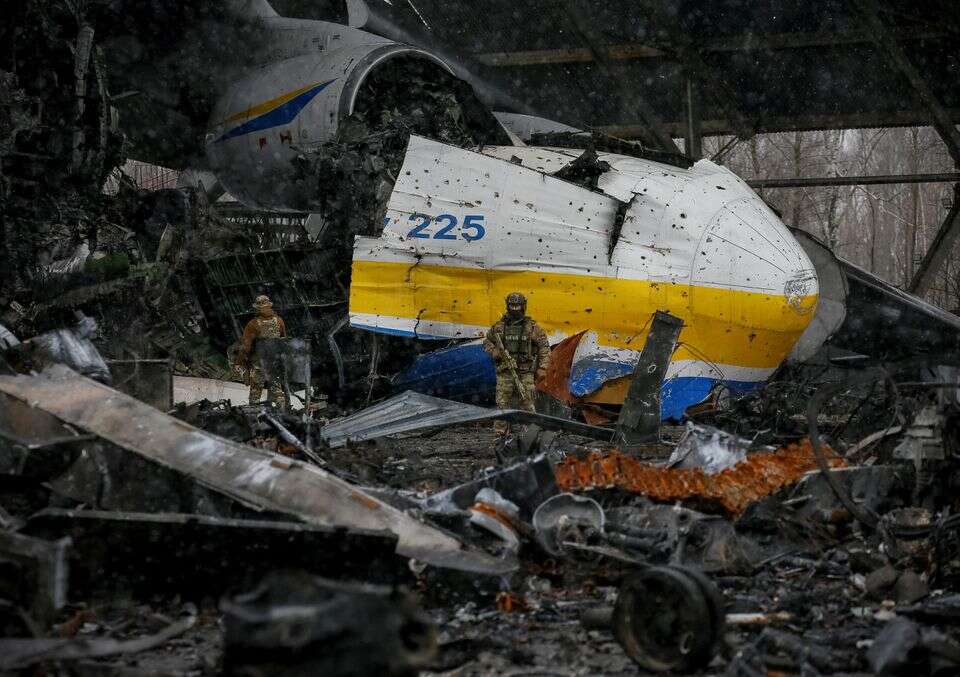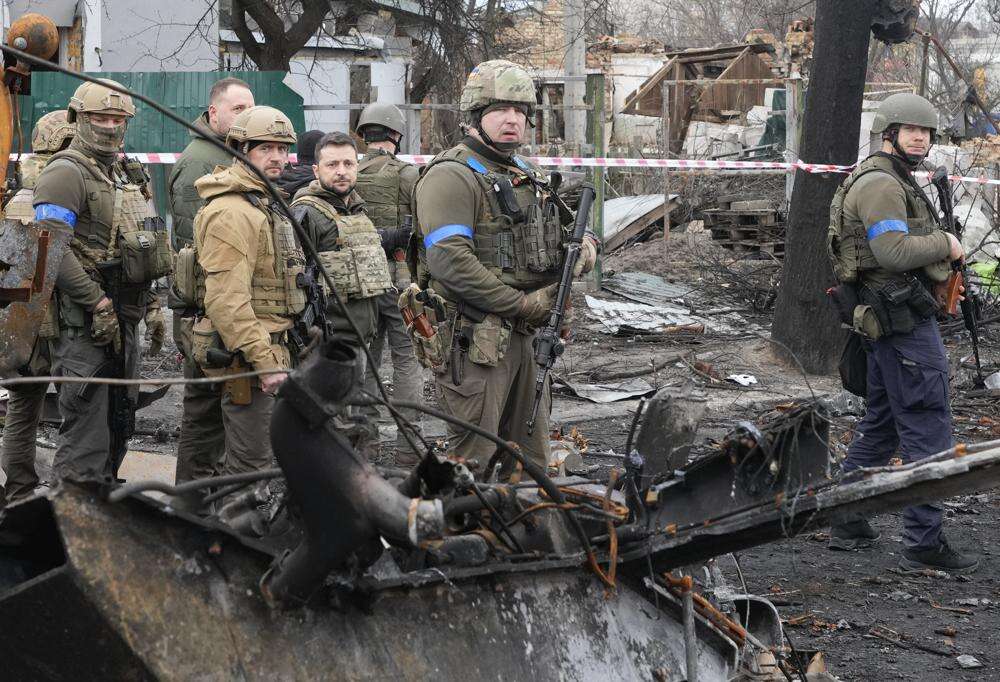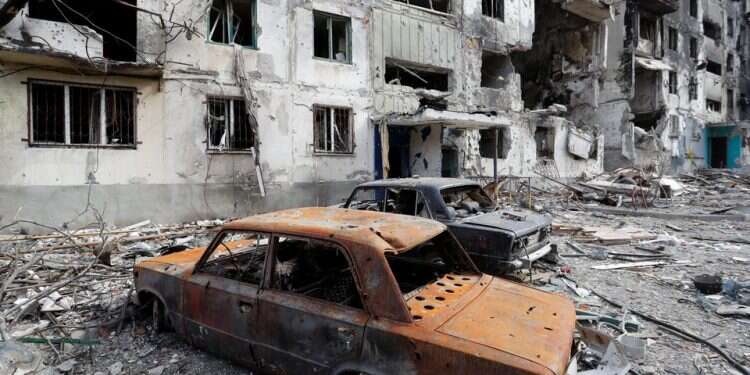Russian forces on Tuesday were planning an offensive in Ukraine's southeast, the Ukrainian military said, as President Volodymyr Zelenskyy prepared to talk to the UN Security Council amid outrage over evidence Moscow's soldiers deliberately killed civilians.
Follow Israel Hayom on Facebook, Twitter, and Instagram
Russian President Vladimir Putin's government is pouring soldiers into Ukraine's east to gain control of the industrial heartland known as the Donbas. That follows a Russian withdrawal from towns around the capital, Kyiv, which led to the discovery of corpses, prompting accusations of war crimes and demands for tougher sanctions on Moscow. Latest Ukrainian reports say 165 children have been killed since the invasion began on Feb. 24, and 266 children have been injured.
On Monday, the United States and European countries pledged to punish Moscow over civilian killings in northern Ukraine.
Russian forces are focused on seizing the cities of Popasna and Rubizhne in the Donetsk and Luhansk regions and the Black Sea port of Mariupol, the General Staff said on its Facebook page. Donetsk and Luhansk are controlled by Russian-backed separatists and recognized by Moscow as independent states. The General Staff said access to Kharkiv in the east, Ukraine's second-largest city, was blocked.
"The enemy is regrouping troops and concentrating its efforts on preparing an offensive operation in the east of our country," the statement said. "The goal is to establish full control over the territory of Donetsk and Luhansk regions."
Zelenskyy, speaking from Ukraine, planned to address Security Council diplomats Tuesday amid demands for an investigation of possible war crimes.
Germany and France reacted by expelling dozens of Russian diplomats, suggesting they were spies. President Joe Biden said Putin should be tried for war crimes.
"This guy is brutal, and what's happening in Bucha is outrageous," Biden said, referring to the town northwest of the capital that was the scene of some of the horrors.
He added, "We have to continue to provide Ukraine with the weapons they need to continue the fight and we have to get all the details so this can be an actual… war crime trial."
Before Zelenskyy speaks, the most powerful UN body is due to be briefed by Secretary-General Antonio Guterres; his political chief, Rosemary DiCarlo; and UN humanitarian chief Martin Griffiths, who is trying to arrange a cease-fire. Griffiths met with Russian officials in Moscow on Monday and is due to visit Ukraine.
Associated Press journalists in Bucha counted dozens of corpses in civilian clothes and apparently without weapons, many shot at close range, and some with their hands bound or their flesh burned.
After touring neighborhoods of Bucha and speaking to hungry survivors lining up for bread, Zelenskyy pledged in a video address that Ukraine would work with the European Union and the International Criminal Court to identify Russian fighters involved in any atrocities.
"The time will come when every Russian will learn the whole truth about who among their fellow citizens killed, who gave orders, who turned a blind eye to the murders," he said.
Zelesnkyy also said the killings had made it harder for Ukraine to negotiate with Russia. Neither side offered updates on peace talks that had been set to resume on Monday. Arab countries have also expressed willingness to mediate between Kyiv and Moscow, Egyptian Foreign Minister Sameh Shoukry said during a press conference in the Russian capital on Monday.
Shoukry is part of an Arab League delegation visiting Moscow to discuss the situation in Ukraine.
Russian Foreign Minister Sergey Lavrov dismissed the scenes outside Kyiv as a "stage-managed anti-Russian provocation." Kremlin spokesperson Dmitry Peskov said the images contained "signs of video forgery and various fakes."
Russia has rejected previous allegations of atrocities as fabrications by Ukraine.
Ukrainian officials said the bodies of at least 410 civilians have been found in towns around Kyiv that were recaptured from Russian forces.
The Ukrainian prosecutor general's office described one room discovered in Bucha as a "torture chamber." In a statement, it said the bodies of five men with their hands bound were found in the basement of a children's sanatorium where civilians were tortured and killed.

Russia's UN ambassador, Vassily Nebenzia, insisted Monday at a news conference that during the time that Bucha was under Russian control, "not a single local person has suffered from any violent action."
However, high-resolution satellite imagery by commercial provider Maxar Technologies showed that many of the bodies have been lying in the open for weeks, during the time that Russian forces were in Bucha. The New York Times first reported on the satellite images showing the dead.
Western and Ukrainian leaders have accused Russia of war crimes before. The International Criminal Court's prosecutor has already opened an investigation. But the latest reports ratcheted up the condemnation.
German Foreign Minister Annalena Baerbock said the images from Bucha reveal the "unbelievable brutality of the Russian leadership and those who follow its propaganda."
French President Emmanuel Macron said there is "clear evidence of war crimes" in Bucha that demand new punitive measures.
"I'm in favor of a new round of sanctions and in particular on coal and gasoline. We need to act," he said on France-Inter radio.
Though united in outrage, the European allies appeared split on how to respond. While Poland urged Europe to quickly wean itself off Russian energy, Germany said it would stick with a gradual approach of phasing out coal and oil imports over the next several months.
Russia withdrew many of its forces from the area around Kyiv after being thwarted in its bid to swiftly capture the capital. It has instead poured troops into southeastern Ukraine.
About two-thirds of the Russian troops around Kyiv have left and are either in Belarus or on their way there, probably getting more supplies and reinforcements, said a senior US defense official who spoke on condition of anonymity to discuss an intelligence assessment.
More than 1,500 civilians were able to escape Mariupol on Monday, using the dwindling number of private vehicles available to leave, Ukrainian Deputy Prime Minister Iryna Vereshchuk said. The besieged southern port city has seen some of the heaviest fighting of the war.
But amid the fighting, a Red Cross-accompanied convoy of buses that has been thwarted for days on end in a bid to deliver supplies and evacuate residents was again unable to get inside the city, Vereshchuk said.
Elsewhere, Russian shelling killed 11 people in the southern city of Mykolaiv, regional governor Vitaliy Kim said in a video message on social media.
Zelenskyy appealed for more weaponry as Russia prepares new offensives.
"If we had already got what we needed – all these planes, tanks, artillery, anti-missile, and anti-ship weapons – we could have saved thousands of people," he said.
Also on Monday, Health Minister Nitzan Horowitz visited the Israeli field hospital built in Ukraine, thanking the staff and pledging Israeli support to the besieged country.
This is the first visit by an Israeli official to war-torn Ukraine since Russia's invasion on February 24.
Horowitz said his visit represents Israel's "unwavering support of Ukraine in the face of the cruel Russian invasion."
Over 2,000 people have been treated at the Kohav Meir field hospital, according to Horowitz, stating that "Israel is the only country that has created such a facility inside Ukrainian territory."
"It is our moral duty, as part of the family of democratic nations, to stand in support of Ukraine," he said in a tweet.
Horowitz is expected to meet with his Ukrainian counterpart during his visit, which was coordinated with Prime Minister Naftali Bennett and Foreign Minister Yair Lapid.
The field hospital was inaugurated some two weeks ago in the city of Mostyska, which sits on the Polish border.
The health minister thanked the staff, stating they had "done something incredible."
"You left everything to come here voluntarily and treat strangers from another country. You provided medical care at the highest level, with great expertise and professionalism in less than ideal conditions. Well done," Horowitz told the delegation, consisting of over 60 doctors and nurses from across Israel.

Meanwhile, Sweden and Finland formed a combined brigade in a scheduled NATO exercise in Arctic Norway known as "Cold Response" for the first time ever on Monday. Neither country is a member of the NATO alliance. The exercise was long-planned, but Russia's invasion of Ukraine added intensity to the war game.
"We would be rather naive not to recognize that there is a threat," Swedish Major Stefan Nordstrom told Reuters. "The security situation in the whole of Europe has changed and we have to accept that, and we have to adapt."
That sense of threat means Putin, who embarked on what he calls a "special operation" in Ukraine partly to counter the expansion of the NATO alliance, may soon have a new NATO neighbor.
Finland has a 1,300 km (810 mile) border with Russia. In a March 28 phone call, the country's President Sauli Niinisto asked NATO Secretary-General Jens Stoltenberg for details on principles and steps for accepting new members, he wrote on Facebook. Finland's leaders have discussed possible membership with "almost all" NATO's 30 members, and will submit a review to parliament by mid-April, Foreign Minister Pekka Haavisto told Reuters.
Sweden – a country that has not fought in a war since 1814 – is more hesitant. But a recent opinion poll for a major Swedish TV station found 59% of Swedes wanted to join NATO if Finland does.
For some in the alliance, the two countries sandwiched between Russia and NATO-member Norway are already partners. US General David Berger, who is the commandant of the US Marines Corps, told reporters at the drill that – putting the politics of membership aside – they were brothers-in-arms during training.
"For marines, at the tactical level ... there's no difference," Berger said. "I just have to know that the unit over there, they have my back. They've got me covered."
Stoltenberg announced in early March that NATO was now sharing all information on the war in Ukraine with Sweden and Finland. Both countries regularly attend NATO meetings. At the exercises in Norway, Stoltenberg said "no other countries in the world" are closer partners.
But he noted an important difference: "The absolute security guarantees that we provide for NATO allies, are only for NATO allies."
Subscribe to Israel Hayom's daily newsletter and never miss our top stories!
As non-members, Finland and Sweden's combined population of 16 million don't have the protection of NATO's guarantee that an attack on one ally is an attack on all.
Moscow did not respond to a request for comment for this story. It has repeatedly warned both countries against joining NATO. On March 12, the Russian foreign ministry said "there will be serious military and political consequences" if they do, according to Russian news agency Interfax.
Stoltenberg has said it would be possible to allow Finland and Sweden in "quite quickly." NATO has not commented on what a fast-track process would be; a spokesperson for the US Department of Defense said any decision would be taken by the countries themselves but their accession would need to be agreed upon by all 30 allies.
"President Putin wants less NATO on Russia's borders," Stoltenberg said in January, also referring to more allied troops in southeastern Europe, Poland, and the Baltics. "But he is getting more NATO."
i24NEWS contributed to this report.




